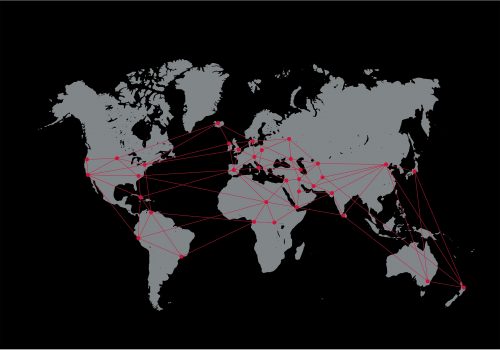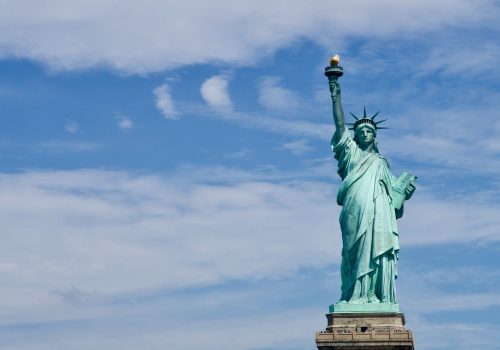Capitalizing on transatlantic concerns about China
Introduction
Under the leadership of Xi Jinping, China has abandoned its traditional “biding one’s time and hiding one’s light” policy and begun aggressively pursuing the goal of so-called “national rejuvenation.”1Tobin Harshaw, “Emperor Xi’s China Is Done Biding Its Time: A Q&A with former Australian Prime Minister Kevin Rudd”, Bloomberg Opinion, March 3, 2018, https://www.belfercenter.org/publication/emperor-xis-china-done-biding-its-time. This grand strategy, better known as the “China Dream,” aims to make China the dominant power by 2049, the centennial of the founding of the People’s Republic of China (PRC). Its elements include: securing the power position of the ruling Chinese Communist Party (CCP); thwarting separatist movements within China, holding onto China’s territorial claims, and achieving unification with Taiwan; and protecting China’s economic security.2For an analysis of Chinese grand strategy see: Andrew Scobell et.al., China’s Grand Strategy, RAND, July 24, 2020, 12, https://www.rand.org/pubs/research_reports/RR2798.html.
Within China, Xi’s rule has resulted in a turn towards hard authoritarianism that has eroded what limited civil liberties the population previously enjoyed. In the outside world, Beijing is pursuing this China-centric strategy aggressively and in a fashion that is causing significant collateral damage to nations around the globe. The most dangerous challenges include neglect for the rule of law, promotion of autocratic practices, predatory economic actions, technology manipulation, diplomatic coercion, excessive sovereign claims, and a profound military build-up. Thus far, the transatlantic partners and the democracies of the world have no comparable strategy to counter these challenges. A new transatlantic approach is needed.
Nations around the globe are now taking a second look at the consequences of China’s grand strategy under Xi Jinping, and concluding that there are hidden dangers for their national sovereignty, economic growth, and democratic progress. This new awakening began before the pandemic, but China’s COVID-19-driven charm offensive, its imposition of the Hong Kong security law, and the increasing intensity of the “Wolf Warrior diplomacy” practiced by Beijing’s envoys around the world have backfired and amplified concerns of democratic nations.3Kunsang Thokmay, “China’s Leaders Facing Global Resistance,” Asia Times, August 5, 2020, https://asiatimes.com/2020/08/chinas-leaders-facing-global-resistance/.
Josep Borrell, the European Union’s (EU) high representative for foreign and security policy, recently called the PRC a “communist country with an authoritarian regime,” noting that “Beijing now sees itself as a world power and is acting as such,” which “results in a power struggle with the USA”—adding that “the West was naive with regard to China.”4Josep Borrell, “China, the United States and Us,” European External Action Service, July 31, 2020, https://eeas.europa.eu/headquarters/headquarters-homepage/83644/china-united-states-and-us_en. This marks a clear break with previous hopes that China’s integration into the Western system would moderate its behavior.
Similarly, NATO Secretary General Jens Stoltenberg recently stated, “In a world of greater global competition, where we see China coming closer to us from the Arctic to cyber space, NATO needs a more global approach.”5Jens Stoltenberg, interview by Nad’a Kovalčíková, Atlantic Council Front Page, Atlantic Council, June 8, 2020, https://www.youtube.com/watch?v=MBtpSod-TPA&feature=emb_title. He also told Germany’s Welt am Sonntag that Beijing had the second-largest defense budget in the world after the United States, and it was investing heavily in nuclear weapons and long-range missiles that could reach Europe.6Christoph B. Schlitz, “China kommt immer näher vor die Haustür Europas,” Welt am Sonntag, June 12, 2020, https://www.welt.de/politik/ausland/article209473417/Nato-Chef-Jens-Stoltenberg-China-kommt-immer-naeher-vor-die-Haustuer-Europas.html. Here, again, is a clear understanding of China’s intention to be an assertive global military power.
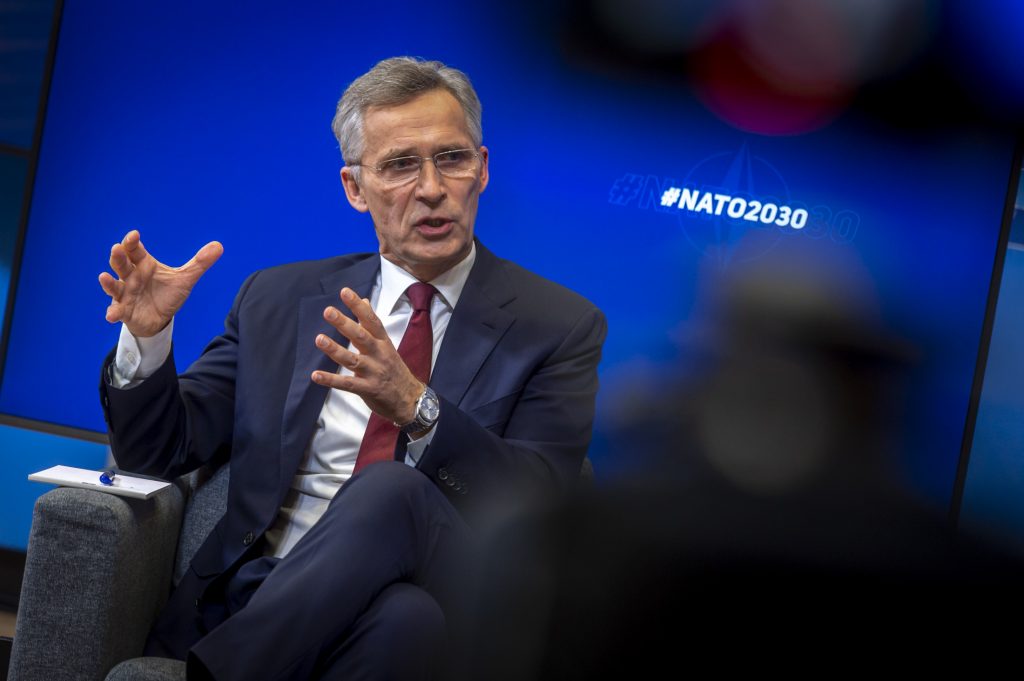
“In a world of greater global competition, where we see China coming closer to us from the Arctic to cyber space, NATO needs a more global approach.”
NATO Secretary General Jens Stoltenberg launched his outline for NATO 2030 in an online conversation with the Atlantic Council and the German Marshall Fund of the United States. Source: NATO
Individual countries, too, are urgently revising their national policies. China’s treatment of Hong Kong has alienated the United Kingdom (UK). A recent report concluded that “the UK’s public and private spheres have moved from a position of relative indifference toward China to a much broader and deeper hostility.”7Sophia Gaston and Rana Mitter, After the Golden Age: Resetting UK-China Engagement, British Foreign Policy Group, July 29, 2020, https://bfpg.co.uk/2020/07/resetting-uk-china-engagement/. This is remarkable given the widely held belief about the vital nature of the Chinese market to a post-Brexit UK. Smaller European nations have also become more security conscious with regard to infrastructure cooperation with China; citing “security reasons,” Estonian Minister of Public Administration Jaak Aab on July 31 announced the rejection of a Chinese-funded plan to link Estonia’s capital, Tallinn, with Finland’s capital, Helsinki, via a tunnel under the Baltic Sea.8Joshua Posaner, “Estonia to Reject China-backed Baltic Tunnel Plan over Security Fears,” POLITICO, July 31, 2020, https://www.politico.eu/article/estonia-to-reject-china-backed-baltic-tunnel-plan-over-security-fears/.
Even Germany, long regarded as China’s most powerful supporter in Europe, has suspended its extradition treaty with Hong Kong, while domestic criticism of Chancellor Angela Merkel’s cautious China policy is mounting. On August 2, German Minister of State for Europe Michael Roth asserted that Europeans “must not be afraid to lock horns when it comes to difficult issues such as human rights, security, and technology,” while calling for European autonomy with respect to fifth-generation (5G) technology because “after all, the security of our citizens is at stake here.”9Michael Roth, “Die Sicherheit unserer Bürger steht auf dem Spiel,” Der Spiegel, August 2, 2020, https://www.spiegel.de/politik/ausland/china-als-europas-systemrivale-die-sicherheit-unserer-buerger-steht-auf-dem-spiel-gastbeitrag-a-c8a2df41-8b57-41d6-8540-40768dfd51f3.
Similar conclusions were reinforced in recent Atlantic Council virtual conferences with US and European experts and scholars. These discussions made clear that harnessing this growing convergence of views is the best way to confront China about its malign polices—in order to either convince Beijing to modify them or to shield the transatlantic community from their effects. China can ignore individual nations or even institutions, but tends to back down when faced with a united front.
US Secretary of State Michael Pompeo recognized this fact during his July 23 speech at the Nixon Library, noting “we can’t face this challenge alone.”10Michael R. Pompeo, “Communist China and the Free World’s Future,” US Department of State, July 23, 2020, https://www.state.gov/communist-china-and-the-free-worlds-future/. This was echoed in Borrell’s July 31 statement that “It is important to have strong cooperation with like-minded democracies. The EU and US should be at the heart of this effort, but we should also be working closely with Japan, India, South Korea, Australia, New Zealand, Canada, and others.”11Borrell, “China, the United States, and Us.” Indeed, NATO’s Stoltenberg similarly concluded “NATO allies must face this challenge together.”12“NATO’s Jens Stoltenberg Sounds Warning on China’s Rise,” Deutsche Welle, June 13, 2020, https://www.dw.com/en/natos-jens-stoltenberg-sounds-warning-on-chinas-rise/a-53795384.
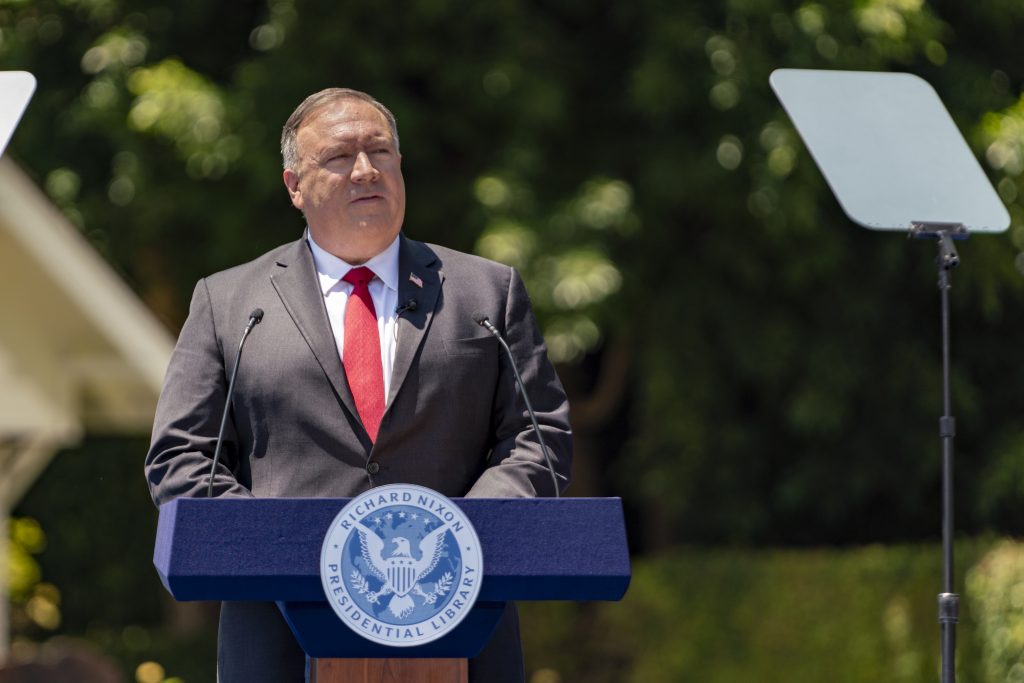
“We cannot repeat the mistakes of these past years. The challenge of China demands exertion, energy from democracies .”
Secretary of State Michael R. Pompeo delivers a speech on “Communist China and the Free World’s Future” at the Richard Nixon Presidential Library, in Yorba Linda, California, on July 23, 2020. [State Department photo by Ron Przysucha/ Public Domain
While the Trump administration’s intense pressure on China has drawn increased international attention to the challenge posed by Beijing, its often-unilateral policy approach has significantly reduced the effectiveness of its efforts. Secretary Pompeo’s recent tour of Central Europe for consultations on China is promising, considering a previously patchy record of coordination with Europe on China policy. Europeans deserve their share of the blame as well, initially having made only slow progress coordinating among each other, which has not helped their ability to constructively engage with the United States.
A more harmonized transatlantic approach is urgently needed in order not to waste this current opportunity to push back against harmful Chinese actions. The United States’ democratic partners want to stop China’s malign activities, not start another Cold War or sever all ties with China. They are increasingly ready to join forces to better define and defend their common interests with the United States vis-à-vis an overbearing China. But, success requires working in a spirit of partnership that is not unilaterally dictated by Washington.
A more harmonized transatlantic approach is urgently needed in order not to waste this current opportunity to push back against harmful Chinese actions.
A New Transatlantic Approach
A better approach is to identify common interests and shared goals among democratic nations to find the areas of maximum transatlantic convergence of views, and then to develop united initiatives that will have impact. One important shared goal is, therefore, to prevent China from exploiting transatlantic as well as trans-European divergences to its own advantage. Thus far, China has generally managed to keep opposition to its policies divided. Efforts by the United States to punish its partners if they do not follow US unilateral initiatives will surely play into China’s divide-and-conquer strategy. On the other hand, if a series of united initiatives where agreement exists can be adopted by a preponderance of democratic nations, progress can be made in confronting China’s malign actions and remaining areas of transatlantic divergence can be better managed. To accomplish this, the EU’s principle of unanimity should be reconsidered, to avoid giving China veto power via its closest European partner countries.
The place to start this approach is by conducting a strategic assessment of the impact of Chinese policies on democratic nations, thereby creating a shared perception of the challenge.13See similar proposal in: Barry Pavel, “China and Iran are about to Become Allies–Here’s What We Should Do about It,” National Interest, July 31, 2020, https://nationalinterest.org/feature/china-and-iran-are-about-become-allies%E2%80%94here%E2%80%99s-what-we-should-do-about-it-165958 Due to widely diverging geopolitical situations, economic interests, and security commitments among transatlantic allies, a common evaluation of the threats posed by China has been difficult to pin down. Greater information sharing could alleviate this. For instance, among transatlantic institutions, NATO and the EU might form a joint committee of intelligence and policy officials to conduct such an assessment and invite Asian and Pacific partners to join. Alternatively, a global ad hoc group of like-minded nations might convene for this purpose. During this process, areas of maximum concern and fields where interests converge should become clear.
Areas of High Convergence
A preliminary Atlantic Council analysis of polices where there are high degrees of transatlantic convergence reveals clear possibilities for powerful joint initiatives. The analysis has focused on five broad areas of Chinese behavior:
- autocratic practices and human-rights violations;
- coercive diplomacy and influence operations;
- technology theft and cyber competition;
- predatory trade and investment practices; and
- aggressive behavior in the military and security areas.
There are differences in the degree of convergence among these.
The highest level of convergence appears to be opposition to Chinese human-rights abuses, particularly in Hong Kong and Xinjiang Province. Based on universal values, democracies share a common interest in assisting threatened constituencies, minorities, and individuals in China and abroad who are under threat from Chinese human-rights abuses. However, China has used its economic and diplomatic muscle to coerce individual nations or companies to silence their criticism of Chinese domestic practices. See, for instance, the effective punishment (and silencing) of the National Basketball Association after a single tweet in support of Hong Kong demonstrators by the general manager of the Houston Rockets.14Josh Rogin, “The NBA Is Only the Latest Chinese Government Hostage,” Washington Post, October 7, 2019, https://www.washingtonpost.com/opinions/2019/10/07/nba-is-only-latest-chinese-government-hostage/. Such censorship can be effective if one nation or entity is targeted at a time and left to fend for itself, but it will be considerably harder against a united front.
For starters, democratic nations should restate the importance of core democratic values, individual human rights, freedom of information, rule of law, and privacy rights in the face of China’s alternative governance model. Apart from the suspension of extradition treaties and the already-existing arms embargoes, further coordinated sanctions should be considered for specific human-rights violations.
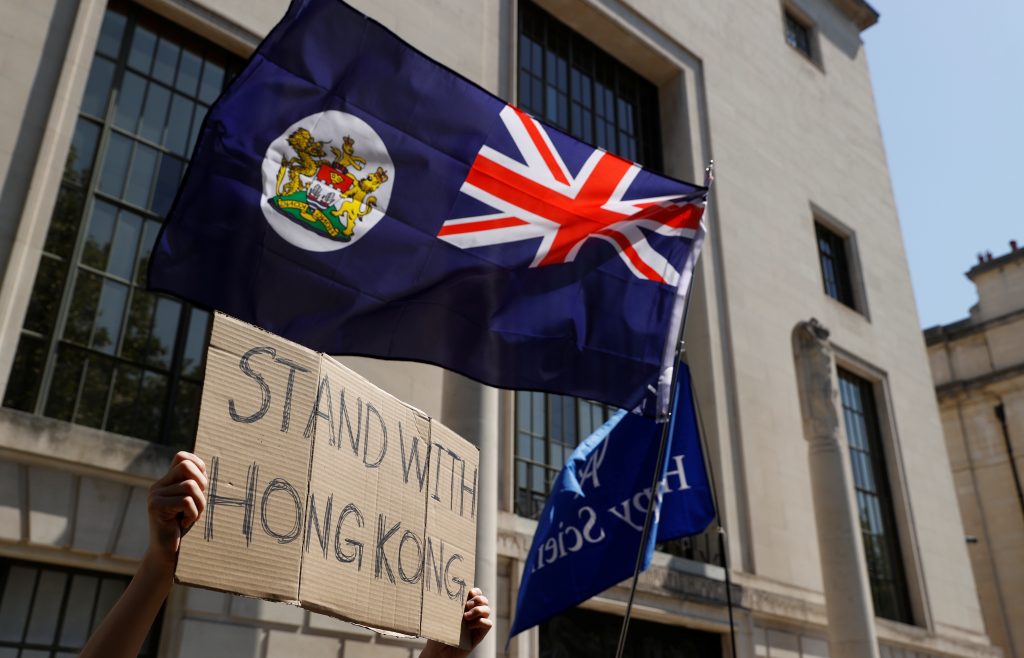
Democratic nations should restate the importance of core democratic values, individual human rights, freedom of information, rule of law, and privacy rights.
A flag of Hong Kong is waved in front of a placard during a protest against Hong Kong’s deteriorating freedoms outside China’s embassy, in London, Britain, July 31, 2020. REUTERS/John Sibley
Closely related is a second area of convergence: opposition to intrusive and coercive Chinese diplomatic practices. This is the overseas corollary to China’s domestic human-rights abuses. Allies share the common goal of preserving the integrity of their own democratic processes and public information spheres. The challenges to be addressed range from Chinese threats of punishment for nations, companies, or individuals who dare to challenge the official Chinese narrative to influence peddling, disinformation campaigns, and intelligence theft by Chinese individuals with undisclosed ties to the People’s Liberation Army (PLA). Another problem is the excessive Chinese party-state influence in the leadership of international organizations.15Kristine Lee and Alexander Sullivan, People’s Republic of the United Nations: China’s Emerging Revisionism in International Organizations, Center for a New American Security, May 14, 2019, https://www.cnas.org/publications/reports/peoples-republic-of-the-united-nations.
Remedies could include agreed economic retaliation if China seeks to censor an entity; rapid public responses to Chinese disinformation; enhanced scrutiny of “civil society,” media entities, and friendship associations with direct ties to the CCP acting abroad; and more vigorous engagement in international organizations to counter growing Chinese influence and to limit China’s control of key positions or committees, especially in security-related fields such as human-rights protection, policing, or public health.
A third area of increasing convergence revolves around digital technology. Allies share the common interest of achieving and maintaining the highest possible degree of resilience against foreign interference, surveillance, and sabotage of their critical infrastructures, while aiming to maintain a world-class industrial base and protecting their intellectual property rights. Many are beginning to recognize that heavy reliance on Chinese telecommunication equipment makes them vulnerable to information theft, excessive surveillance, and dependence on Chinese networks. At the same time, private Western tech companies are facing unequal competition from directly or indirectly subsidized Chinese players, which hold undisclosed ties to the CCP and are beholden to China’s cybersecurity law, with its problematic stipulations regarding state access to private user data. If this goes unchecked, global digital standards risk being dominated by Chinese standards. Convergence in this area among democracies has been slow to solidify because Chinese technology is de-facto subsidized, and thus cheaper, and because Western technology is sometimes less advanced.16Chuin-Wei Yap, “State Support Helped Fuel Huawei’s Global Rise,” Wall Street Journal, December 25, 2019, https://www.wsj.com/articles/state-support-helped-fuel-huaweis-global-rise-11577280736.
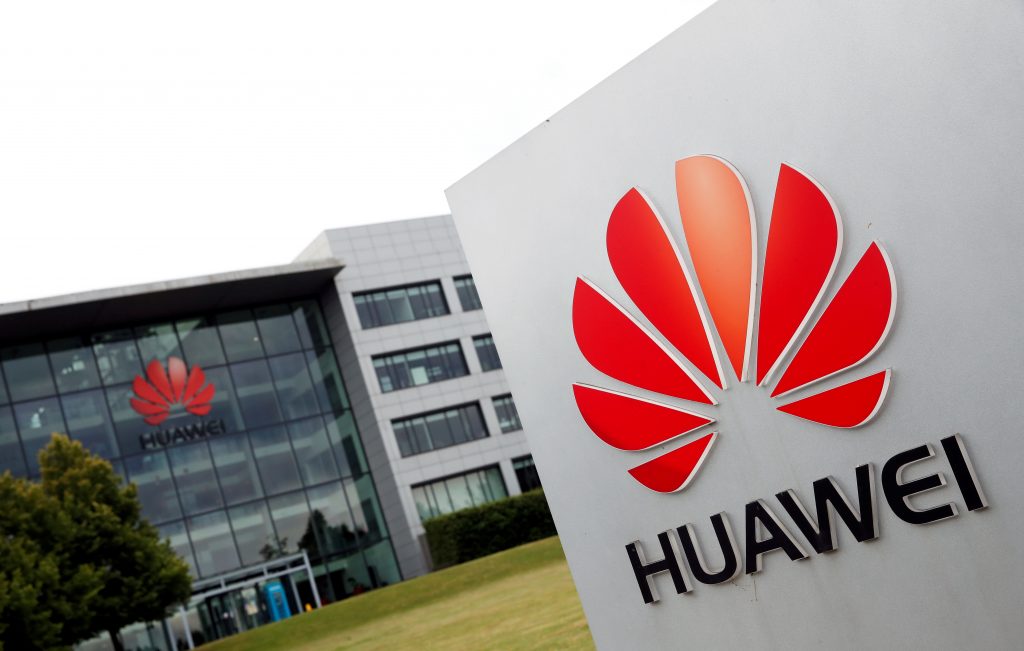
Private Western tech companies are facing unequal competition from directly or indirectly subsidized Chinese players, which hold undisclosed ties to the CCP.
Huawei logo pictured outside its headquarters building in Reading, Britain, July 14, 2020. REUTERS/Matthew Childs/File Photo
Progress has been made in the Huawei 5G case, as the UK, Australia, New Zealand, Japan, France, and others have limited or completely banned Huawei involvement, while Germany and others are still considering their options.17Katharina Buchholz, “Which Countries Have Banned Huawei?” Statista, January 30, 2020, https://www.statista.com/chart/17528/countries-which-have-banned-huawei-products/. This new awareness might stimulate several other initiatives, such as negotiated global digital standards, a process to regulate critical technology trade with China, governmental efforts to subsidize or otherwise protect Western technologies that compete with Chinese-subsidized firms, or “framework nation” concepts where more technologically advanced countries can be paired with less capable ones to work through the mechanics of technological independence from China.
Areas of More Limited Convergence
Convergence may be more difficult in the fourth area: economics, trade, investment, debt, and intellectual-property rights. The risk of diverging policies is greater here because nations have gone their own ways, even though allies share a common interest in creating and securing a level playing field for their industries that have to compete with giant CCP-controlled state-owned enterprises, not just within China, but across the Belt and Road Initiative (BRI) countries and within their own home markets. Here, the abandonment of the Transatlantic Trade and Investment Partnership (TTIP) and the Trans-Pacific Partnership (TPP) Agreements by the Trump administration have undercut the basis for coordinated approaches.
China holds varying degrees of economic leverage over many of the United States’ allies and partners, solidifying influence through strategic infrastructure investments within the framework of the BRI. EU members have followed ambiguous policies, with a majority of EU states signing individual BRI memoranda of understanding with China, whereas the EU as an organization has attempted to counter the lure of BRI investments for its members by launching its own “Connectivity Strategy” in 2018.18“Joint Communication to the European Parliament, the Council, the European Economic and Social Committee, the Committee of the Regions and the European Investment Bank—Connecting Europe and Asia: Building Blocks for an EU Strategy,” European External Action Service, September 19, 2018, https://eeas.europa.eu/headquarters/headquarters-homepage/50708/connecting-europe-and-asia-building-blocks-eu-strategy_en. Meanwhile, the United States has started separate trade wars with both China and the EU, only to negotiate a Phase One trade agreement with China without reference to its other trading partners. By initiating trade fights with both natural partners and systemic challengers, the US government has neutralized its ability to work in transatlantic unison to achieve its policy goals.
Nonetheless, several economic initiatives are possible. First, new transatlantic and transpacific trade and investment agreements should be negotiated. Supply-chain vulnerabilities in strategic areas need to be repaired, and investment screening in critical technology sectors should be practiced more thoroughly. Transatlantic partners could coordinate their policies toward the BRI more carefully to reduce the growing dependency on China, both in Europe and along the new Silk Road. The EU-China Comprehensive Investment Agreement, still under negotiation, might be multilateralized. Common approaches can be organized to gain access to Chinese markets. China can be encouraged to shift from coal to sustainable energy more quickly. China should be urged to participate in global debt rescheduling. In Europe, support for the Three Seas Initiative will reduce risks associated with Chinese economic penetration in Central Europe. And, multilateral mechanisms can be set up to assure that China complies with economic agreements that it has reached.
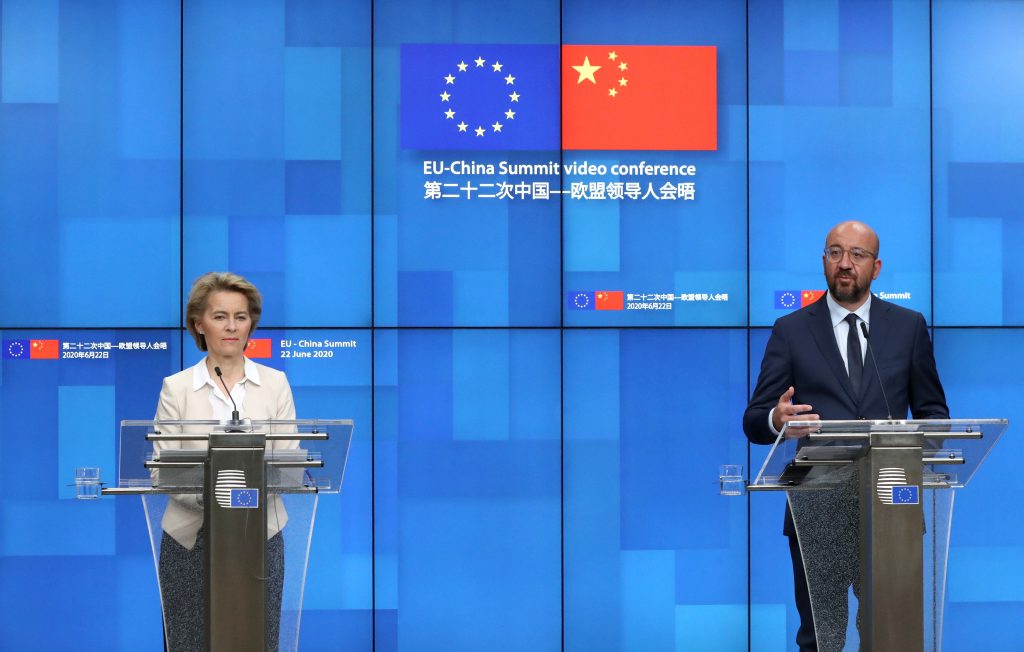
The EU-China Comprehensive Investment Agreement, still under negotiation, might be multilateralized.
European Council President Charles Michel and European Commission President Ursula von der Leyen attend a news conference following a virtual summit with Chinese President Xi Jinping in Brussels, Belgium June 22, 2020. REUTERS/Yves Herman/Pool
The final category, defense and security, has elements of both convergence and divergence. Within Europe, US allies are recognizing the security implications associated with Chinese investments in critical infrastructure and are attentively watching Russian-Chinese military exercises in the European region, which could be a harbinger for more intensive defense cooperation between Moscow and Beijing in the future or a gateway to more Chinese military activity in the European theater. Nevertheless, opportunities for divergence are plentiful. China’s growing conventional military capabilities, especially missile and naval advances, are forcing the United States to increase its defense spending. Europeans do not yet see a conventional Chinese military threat to the European homeland, and tend to be more worried about Russian cyber and hybrid activities than Chinese ones.
While the US military is increasingly focused on deterring newly aggressive Chinese activities in the Taiwan Strait and the East and South China Seas, few European militaries are directly engaged in these missions. Should armed conflict break out between the United States and China, European nations would contribute modestly, if at all. European NATO members would then face a situation in which US attention and capabilities are focused primarily on the Asian theater, rather than Europe.
Nonetheless, democratic countries share an interest in deterring China from military aggression against Taiwan—not least due to the risk of great-power conflict that this would entail, with incalculable consequences for US allies and NATO—as well as upholding freedom of navigation and access to the global commons in general, and limiting the military footprint of China in their regions. This includes limiting access of the PLA and PLA-controlled entities and individuals to high-tech research, critical infrastructures, and dual-use technologies.
Some cooperative transatlantic military steps can be taken in Asia. Greater European participation in naval exercises in the Indo-Pacific region would be useful, either by individual nations or as an Alliance. More exchanges with European officers serving alongside US personnel in Asia would help, and could have deterrent value. NATO might even create a small headquarters in Asia. However, the most important contribution Europe can make to Chinese security challenges in Asia is to strengthen its own ability to manage Russian military challenges in Europe, and to relieve the United States of some of its European burden.
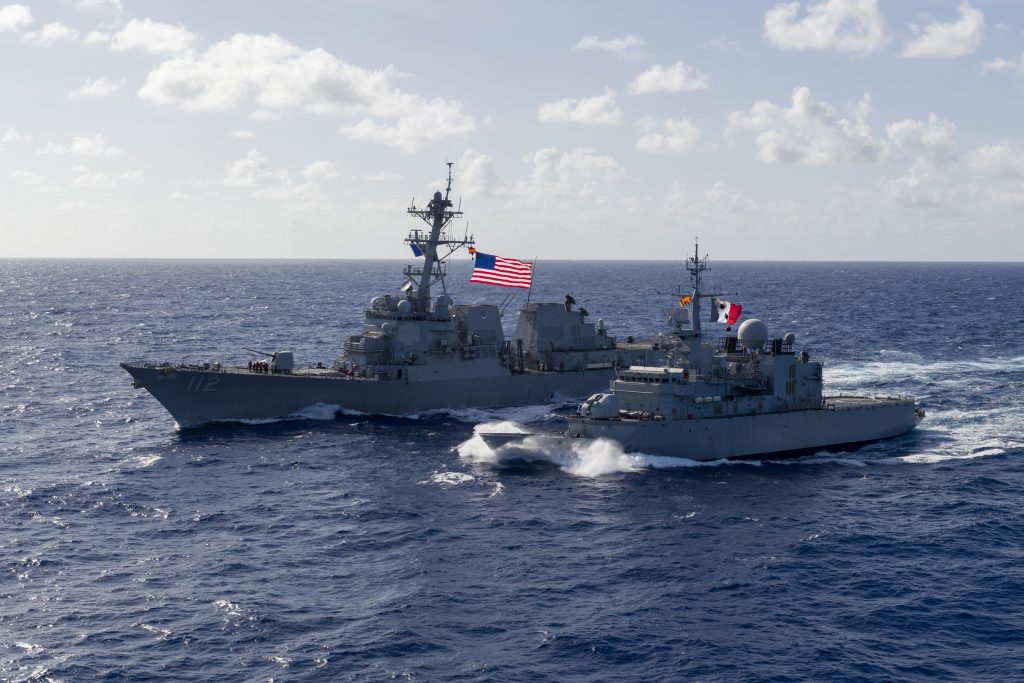
Greater European participation in naval exercises in the Indo-Pacific region would be useful, either by individual nations or as an Alliance.
The Arleigh Burke-Class guided-missile destroyer USS Michael Murphy (DDG 112) and the French frigate FNS Vendemiaire are underway in formation during a passing exercise (PASSEX) in the Pacific Ocean in January 2018. Michael Murphy was operating in the Pacific region as part of the Carl Vinson Carrier Strike Group. US Navy photo by Mass Communication Specialist 3rd Class Jasen Moreno Garcia/Released
Challenges exist outside of Asia and in other domains as well, including nuclear and space. In the nuclear realm, US efforts to bring China into strategic arms-limitation talks are putting extension of the New Strategic Arms Reduction Treaty (START) at risk, assuming Beijing remains as resistant as Washington remains insistent about China’s inclusion. The impact will be felt in Europe. Finally, there is little transatlantic dialogue or coordination of efforts to confront creeping Chinese influence in Africa, the Middle East, and Latin America.
NATO has already signaled that it will coordinate more with Asian democracies to deal with Chinese security challenges. In doing so, NATO might seek a more multilateral approach to Asian partnerships that are generally conducted bilaterally. The Alliance should focus more on China when drafting a new strategic concept, probably next year. And, NATO could start to systematically monitor and publicly report security-related problematic behaviors. A NATO Center of Excellence on China might be established, perhaps in Italy or Greece, nations that would benefit from a more realistic view of Chinese ambitions. It should defuse Chinese investments in critical infrastructures that might impede NATO military operations.
More can be done cooperatively in the global commons as well. NATO might work with the Arctic nations to assure that Chinese military vessels stay clear of the Arctic, and NATO might also find disincentives for Chinese joint naval exercises with Russia. For example, for every Chinese naval vessel involved in a joint exercise with Russia in the European area, European navies might send one vessel to participate in US freedom-of-navigation exercises in the South China Sea.
Implementing a New Policy
These unified efforts need not be packaged in one set of comprehensive demands. They may be more manageable if approached in bite-sized chunks, allowing consensus among democratic nations to form around them.
As specific transatlantic initiatives emerge, they need to be balanced to account for national priorities. The United States’ national security priorities may be in the reverse order of the areas of convergence. For example, defending its Asian allies while avoiding outright conflict is probably the United States’ highest priority in dealing with China. Countering Chinese coercive diplomacy may have a higher priority in Europe than in the United States because Europe is more vulnerable and is a principal victim.
At the same time, channels for dialogue with Beijing should be kept open, even in difficult circumstances and on difficult topics—not just with the political center, but also with other constituencies within China that may share occasional common interests with democratic nations. The purpose of these efforts should primarily be reforming Chinese practices.
Given the broad scope of the Chinese challenge, several new or adapted institutions will need to be established. A special US-EU commission on China might be established, with NATO included as an institutional voice on security issues. Both the United States and EU hold periodic talks with China on a broad array of topics. Some of these meetings might become trilateral. To engage China in a human-rights discussion, one might envision something akin to the 1975 Helsinki Accords process, especially basket three on human rights. China might meet periodically with a group of the largest democratic nations—sometimes called the D10—to focus on human rights and related aspects of this agenda. A NATO-China Council, like the NATO-Russia Council, could be established for routine dialogue on common security issues.19Barry Pavel and Ian Brzezinski, “It’s Time for a NATO-China Council,” Defense One, August 21, 2019, https://www.defenseone.com/ideas/2019/08/its-time-nato-china-council/159326/. One immediate focus could be contending claims in the South and East China Seas. Or existing groupings such as the Group of Twenty (G20) could be adapted for this purpose.
Considering the Alternative
Democratic nations share the aim of reining in Chinese behaviors that are detrimental to their interests. Any such initiatives are far more likely to be successful together than apart. European actors are sharpening their demands and setting clearer boundaries, but comprehensive transatlantic coordination would likely yield much stronger results.
If cooperative efforts such as the ones suggested here are not pursued, China is unlikely to be deterred from its present practices, and the United States could become even more confrontational and unilateral in its own efforts to counter Chinese challenges. The stage would be set for deeper transatlantic divisions and possible conflict between the two superpowers. A better option is available.
About the authors

Dr. Hans Binnendijk is a distinguished fellow at the Atlantic Council’s Scowcroft Center for Strategy and Security.
Previously, he was a senior fellow at the Center for Transatlantic Relations at Johns Hopkins’ School of Advanced International Studies. Until 2012, he was the vice president for research at the National Defense University and director of the Institute for National Strategic Studies. He previously served twice on the National Security Council staff as senior director for Defense Policy and Arms Control and earlier as an officer for Southern European Affairs. He also served as deputy director and acting director of the State Department’s Policy Planning Staff and as deputy staff director and legislative director of the Senate Foreign Relations Committee. In academia, he was director of Georgetown University’s Institute for the Study of Diplomacy and deputy director and director of studies of London’s Institute for International Strategic Studies. He has received numerous awards for his government service, including three Distinguished Public Service Awards and a Superior Service Award, in addition to receiving the Cross of the Order of Merit from the Federal Republic of Germany. Binnendijk is author, coauthor, or editor of nearly 20 books and has written over 200 articles, editorials, and reports. He received his BA in history from the University of Pennsylvania and his MALD and his PhD in international relations from the Fletcher School of Law and Diplomacy at Tufts University.

Dr. Sarah Kirchberger is head of the Center for Asia-Pacific Strategy and Security at the Institute for Security Policy at Kiel University (ISPK). Her current work focuses on maritime security in the Asia-Pacific region, Russian–Chinese military relations, China’s arms industries, and China’s naval and space development. Before joining ISPK she was assistant professor of contemporary China at the University of Hamburg, and previously worked as a naval analyst with shipbuilder Blohm + Voss. She is the author of Assessing China’s Naval Power: Technological Innovation, Economic Constraints, and Strategic Implications (2015). She completed undergraduate and graduate studies in Sinology, Political Science and Archaeology in Hamburg, Taipei, and Trier and holds an MA and a PhD in Sinology from the University of Hamburg.

Christopher Skaluba is the director of the Transatlantic Security Initiative in the Atlantic Council’s Scowcroft Center for Strategy and Security and an adjunct professor of practice in international relations at Maxwell School of Citizenship and Public Affairs at Syracuse University. From 2001 to 2016, Chris served as a career civil servant in the office of the secretary of defense, rising from presidential management fellow to the senior executive service. His most prominent roles included serving as the principal director for strategy and force development, acting deputy assistant secretary of defense for Middle East policy, and as the principal director for European and NATO policy. During his lengthy tenure in the latter role, he conducted defense relationships with thirty-one European nations and helped inaugurate the European Deterrence Initiative. Chris also completed an exchange assignment in the UK Ministry of Defence as the desk officer for Japan and South Korea. He earned an MA in International Relations at Syracuse’s Maxwell School and an MA in English from Syracuse’s College of Arts and Sciences. Chris completed his undergraduate studies in English and History at the Pennsylvania State University.
The Scowcroft Center for Strategy and Security works to develop sustainable, nonpartisan strategies to address the most important security challenges facing the United States and the world. The Center honors General Brent Scowcroft’s legacy of service and embodies his ethos of nonpartisan commitment to the cause of security, support for US leadership in cooperation with allies and partners, and dedication to the mentorship of the next generation of leaders.
The Scowcroft Center’s Transatlantic Security Initiative brings together top policy makers, government and military officials, business leaders, and experts from Europe and North America to share insights, strengthen cooperation, and develop innovative approaches to the key challenges facing NATO and the transatlantic community. This report was produced under the auspices of a project conducted in partnership with the Norwegian Ministry of Foreign Affairs focused on assessing the impact of China’s rise on transatlantic relations.
This report is written and published in accordance with the Atlantic Council Policy on Intellectual Independence. The authors are solely responsible for its analysis and recommendations. The Atlantic Council and its donors do not determine, nor do they necessarily endorse or advocate for, any of this report’s conclusions.
Further reading
Subscribe for events and publications on transatlantic security
Sign up for updates from the Atlantic Council’s Transatlantic Security Initiative, covering the debate on the greatest security challenges facing the North Atlantic Alliance and its key partners.

The Transatlantic Security Initiative, in the Scowcroft Center for Strategy and Security, shapes and influences the debate on the greatest security challenges facing the North Atlantic Alliance and its key partners.
Image: Chinese President Xi Jinping walks past officials wearing face masks following the coronavirus disease (COVID-19) outbreak as he arrives for the opening session of the National People's Congress (NPC) at the Great Hall of the People in Beijing, China May 22, 2020. REUTERS/Carlos Garcia Rawlins
